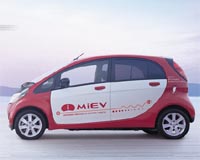 |
Yokosuka, Japan (AFP) Jan 27, 2011 At first glance Nissan's Oppama plant looks like any other. But a closer look reveals workers inserting lithium-ion batteries and electric motors in every sixth vehicle on the production line. Oppama is home to the production of Nissan's all-electric Leaf, key to the green ambitions of the Japanese auto giant and its French partner Renault, which have sunk four billion euros ($5.5 billion) into the project. On a rolling conveyor belt, Leaf frames sit alongside conventional petrol models as workers alternate quickly between them, inserting battery packs and electric motors shuttled to them in an automatic cart. After 16 hours on the production line, the frames have been fitted with their own exhaust-free chassis and electric power units and are ready for rigorous testing. "We can produce both types of models at the same time as the assembly process is not that different between the two engine types," says plant manager Seiji Honda on the sidelines of a press tour of the facility. But Nissan hopes that the automobile -- whose name is an acronym for Leading Environmentally-friendly Affordable Family car -- will be a milestone in the industry's efforts to move on from its petrol-reliant past. Billed as the first mass-produced electric vehicle available globally, 6,000 Leafs had been pre-ordered in Japan and 20,000 in the United States before the car's official launch last month. The Leaf is selling for 2.98 million yen (36,350 dollars) in Japan and about 25,280 dollars in the United States, once government tax breaks designed to promote green cars are taken into account. The car is also on sale in Portugal, with deliveries scheduled to begin in select European markets in the coming months. It can be charged in eight hours at home on a standard plug, or in 30 minutes at a dedicated quick-charging station, for a range of roughly 200 kilometres (125 miles), according to Nissan. The Leaf emits none of the tailpipe pollutants that have covered city skies in smog and is touted as a step forward from petrol-electric hybrids produced by the likes of Toyota, which makes the best-selling Prius. However, the pace of production for Nissan's environmental flagship has been slow. Japanese media reported that only 60 Leafs had been delivered by Nissan in Japan as of January 14, far short of the 6,000 orders it has promised to fulfil by the end of March. Nissan has denied any delay and says it is simply taking a cautious approach to ensure quality control and will eventually ramp up production to meet its delivery deadline. "We are working hard to eventually produce 50,000 units per year," said Nissan vice president Toshiharu Sakai. The plant has already made a total of about 3,000 Leaf cars since starting production in late October, plant manager Honda said. "We have trained our assembly line employees on how to put the Leaf together and have just hired a score of extra workers on the site" where approximately 2,100 people are employed, says Honda. Oppama will be solely responsible for global Leaf production until a new plant in Smyrna, in the US state of Tennessee, opens in 2012 with a maximum capacity estimated at 150,000 units per year. The automaker also aims to start production at Sunderland, northeast England, from 2013 with a capacity for 50,000 vehicles annually. Battery modules and other precision parts specific to the Leaf are assembled in automated factories nearby "in order to reduce logistics costs", said Sakai. By relying on cheaper robots to produce parts such as the Leaf battery, Nissan says it is mitigating the impact of a strong yen, which has prompted companies to consider moving production overseas to remain competitive. And against cheaper competition, Nissan's Leaf project faces various challenges according to analysts who say the vehicle's production cost means it is unlikely to give an initial boost to the automaker's earnings. The company has nevertheless gambled that its electric car will take off globally and help drive a fledgling market. Toyota aims to launch its own electric car by 2012 but has put its immediate focus on new hybrid models, to build on its success with the Prius.
Share This Article With Planet Earth
Related Links Car Technology at SpaceMart.com
 Mitsubishi to launch eight new green cars by 2016
Mitsubishi to launch eight new green cars by 2016Tokyo (AFP) Jan 20, 2011 Japan's Mitsubishi Motors said Thursday it would launch a new line-up of environmentally friendly cars by March 2016 and double operating profit in the next three years by focusing on emerging markets. Mitsubishi will launch a total of eight electric vehicles and plug-in hybrids, starting with a mini commercial vehicle, the MINICAB-MiEV, the company said as it unveiled a new mid-term busin ... read more |
|
| The content herein, unless otherwise known to be public domain, are Copyright 1995-2010 - SpaceDaily. AFP and UPI Wire Stories are copyright Agence France-Presse and United Press International. ESA Portal Reports are copyright European Space Agency. All NASA sourced material is public domain. Additional copyrights may apply in whole or part to other bona fide parties. Advertising does not imply endorsement,agreement or approval of any opinions, statements or information provided by SpaceDaily on any Web page published or hosted by SpaceDaily. Privacy Statement |